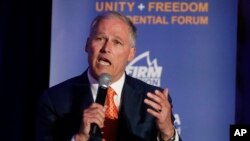Democratic presidential hopeful Jay Inslee wants the U.S. to shape all foreign policy decisions around a commitment to combat the climate crisis, including willingness to use tariffs, other trade incentives and international finance rules to compel other nations to reduce carbon pollution.
"Our goal is to re-establish American leadership in the fight against climate crisis and use all the tools in the international relations toolbox," Inslee told The Associated Press.
That vision could involve butting heads with China, the world's leading carbon polluter, and leading oil producers including Russia and Saudi Arabia. But Inslee said the crisis demands a tough approach. "We certainly have an obligation not only to ask but to use mechanisms to put pressure on that direction," he said.
The Washington governor is outlining his agenda Wednesday in a speech to the Council on Foreign Relations in New York.
His proposals, posted on his campaign website , start with keeping the U.S. in the United Nations climate pact of 2015. President Donald Trump has withdrawn the U.S. from the Paris agreement.
Inslee said the Paris standards are not enough. He also would have the U.S. join an international alliance that calls for phasing out coal plant pollution by 2030 and increase U.S financial commitments to alliances focused on climate action.
He frames the world's growing migrant crisis as a part of a changing climate and an international economy anchored to fossil fuels, as extreme weather and other climate effects force people to migrate "in search of food, water, shelter, or to avoid conflict."
He calls for focusing international development funds to building local economies in nations most affected by climate changes and economic instability.
Inslee praised China for its domestic efforts to reduce carbon pollution. But he notes that China's "Belt and Road Initiative," an infrastructure development effort that would expand trade and transportation routes across Asia to Europe and Africa, doesn't involve the same commitments to reducing pollutants.
"It doesn't solve the problem for China to do big investments in clean energy domestically, which they are doing ... and then spoil that progress by building coal plants, dozens or hundreds, around the world," Inslee said.




























